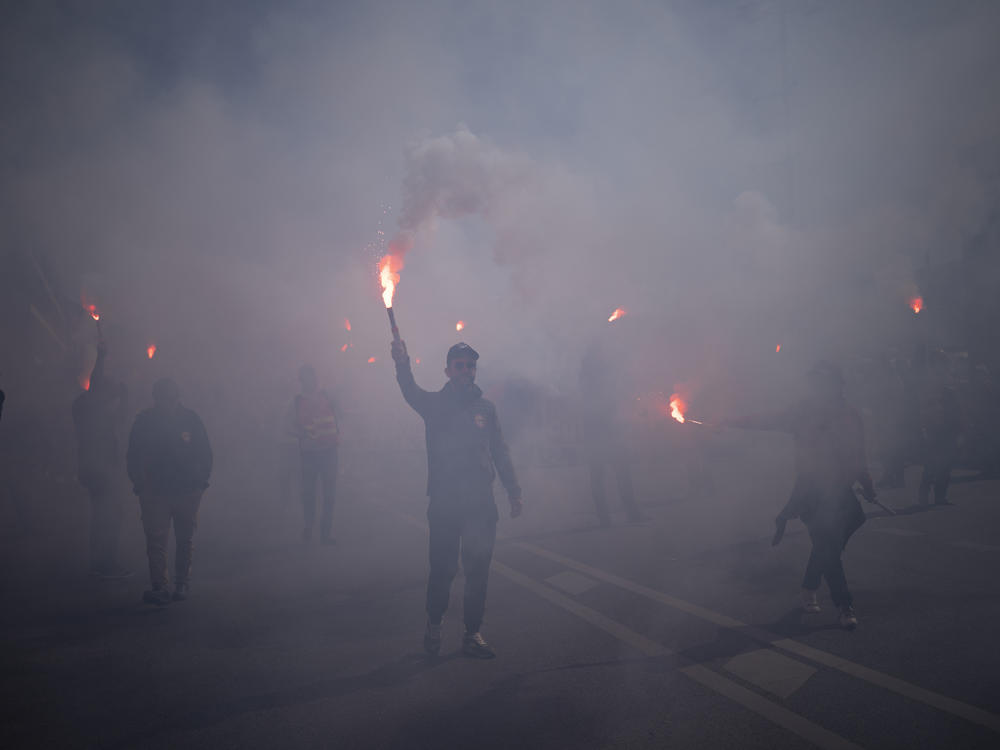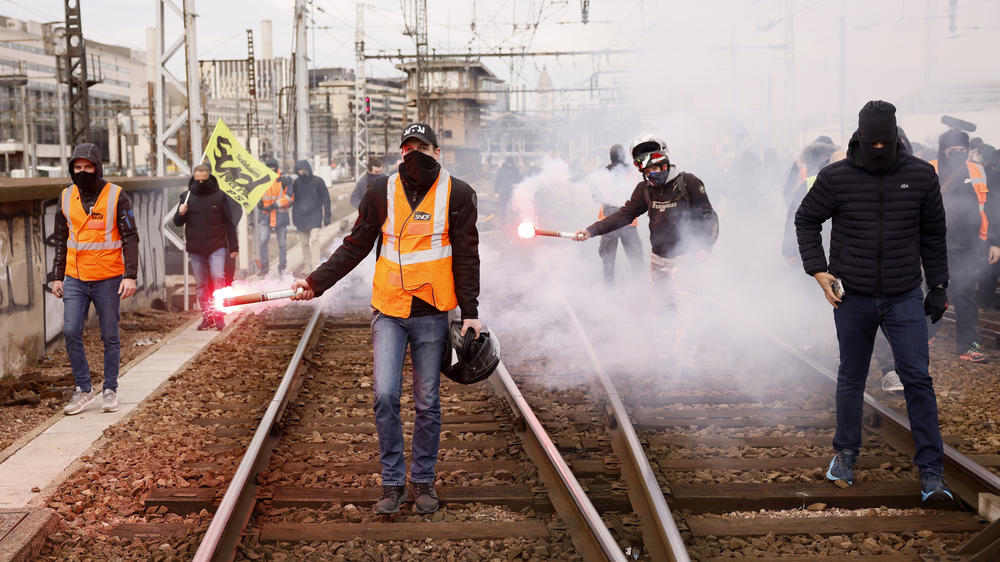Section Branding
Header Content
A new wave of pension protest breaks out in France as police brace for violence
Primary Content
Updated March 28, 2023 at 9:48 AM ET
PARIS — Protests and strikes against unpopular pension reforms gripped France again Tuesday, with many thousands marching and the Eiffel Tower closed and police ramping up security amid government warnings that radical demonstrators intended "to destroy, to injure and to kill."
Concerns that violence could mar the demonstrations prompted what Interior Minister Gérald Darmanin described as an unprecedented deployment of 13,000 officers, nearly half of them concentrated in the French capital.
After months of upheaval, an exit from the firestorm of protest triggered by President Emmanuel Macron 's changes to France's retirement system looked as far away as ever. Despite fresh union pleas hat the government pause its hotly contested push to raise France's legal retirement age from 62 to 64, Macron seemingly remained wedded to it.
The French leader previously used a special constitutional power to ram the reform past legislators without allowing them a vote. His move this month further galvanized the protest movement. Violence has since flared and thousands of tons of stinking garbage have piled up on Paris' streets as sanitation workers strike.
The Eiffel Tower's website announced that strikers had closed down the world-famous tourist attraction. The Louvre Museum was similarly strike-bound on Monday.
"Everybody is getting madder," said Clément Saild, a train passenger at Paris' Gare de Lyon railway station, where tracks were temporarily invaded and blocked Tuesday by protesting workers.
He said said he supports the strikes despite their impact on transportation and other services.
"I am 26, and I wonder if I will ever retire," he said.
Another passenger, Helene Cogan, 70, said: "French people are stubborn and things are getting out of hand."
The wave of protests Tuesday marked the 10th time since January that unions have called on workers to walk out and for demonstrators to flood the nation's streets against Macron's retirement changes, which are a key priority of his second term as president.
His government argues that France's pension system will dive into deficit without reform, because of the lower birth rates and longer life expectancy in many richer nations. Macron's opponents say additional funding for pensions could come from other sources, without having to make workers retire later.
Demonstrations got underway peacefully Tuesday morning, with large crowds in multiple cities. But police reported being pelted with objects and responded with tear gas to disperse demonstrators in the western city of Nantes and were braced for violence elsewhere.
The interior minister said more than 1,000 "radical" troublemakers, some from overseas, could latch on to marches in Paris and other cities.
"They come to destroy, to injure and to kill police officers and gendarmes. Their goals have nothing to do with the pension reform. Their goals are to destabilize our republican institutions and bring blood and fire down on France," the minister said Monday in detailing the policing.
Some protesters, human rights campaigners and Macron's political opponents allege that police officers have used excessive force against demonstrators. A police oversight body is investigating multiple claims of wrongdoing by officers.
The striking railway workers outside Gare de Lyon marched behind a banner that alleged: "The police mutilates. We don't forgive!"
Lucie Henry, a 36-year-old protester, said that by skirting parliament to impose his reform, Macron "has set everyone on fire."
"What adds fuel to the fire is the behavior of the government, the police violence in particular," she said.
Macron's opponents are urging him to cool tempers by backing down. Union leader Laurent Berger appealed Tuesday for a pause in implementing the retirement reform and for mediation.
"If we want to avoid tensions — and I want to avoid them —- what the trade unions are proposing is a gesture to calm things down," he said. "It must be seized."
But government spokesman Olivier Veran said mediation wasn't needed for unions and the government to talk to each other.
The latest round of protests prompted Macron to indefinitely postpone a planned state visit this week by King Charles III.
Veran insisted, however, that France remains a welcoming place for all non-royal visitors.
"Life goes on," he said.
Copyright 2023 NPR. To see more, visit https://www.npr.org.




